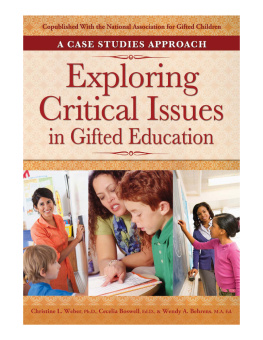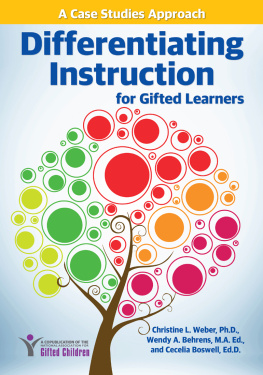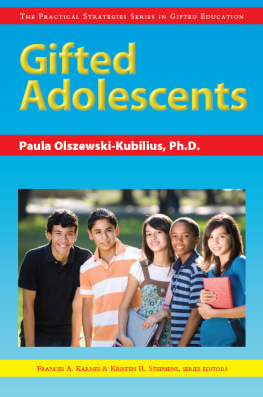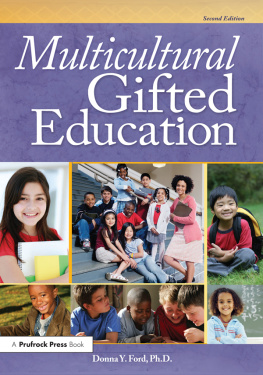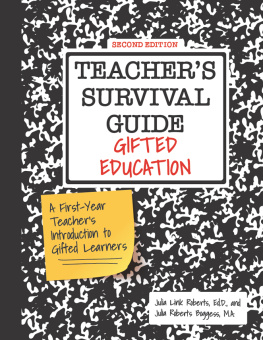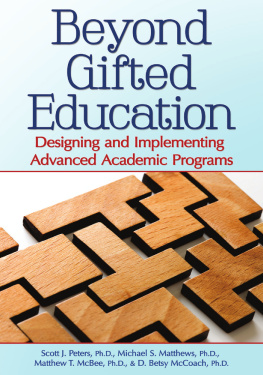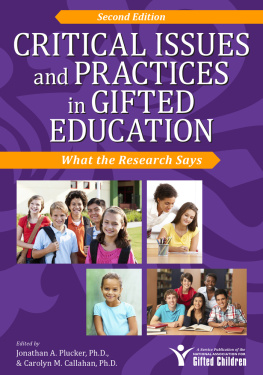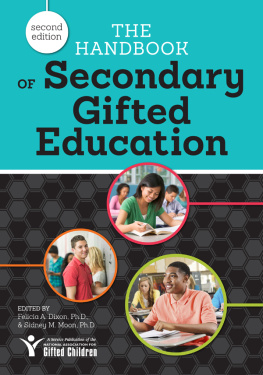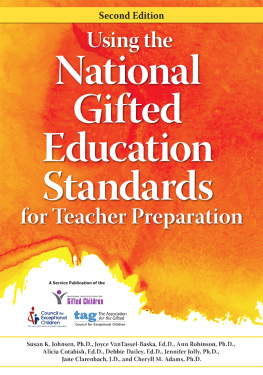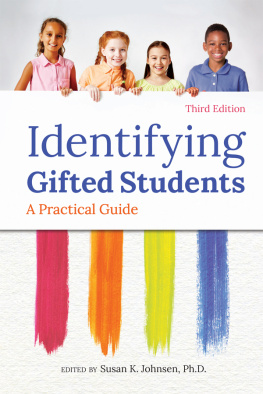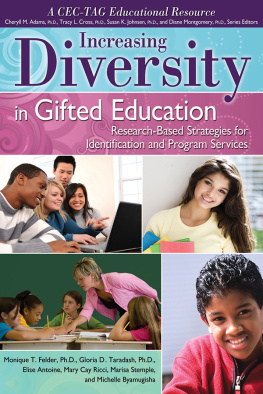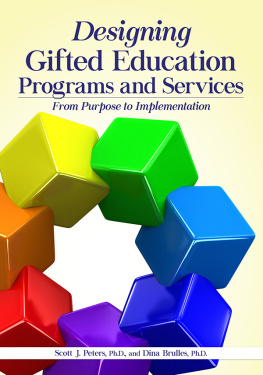About the Authors

Christine L. Weber, Ph.D., is an associate professor of Childhood Education, Literacy, and TESOL at the University of North Florida in Jacksonville. She instructs teachers in strategies for conceptual teaching and learning, assessment tools, and meeting the needs of gifted learners. She has been a member of the Editorial Review Board for Gifted Child Today since 1998. Under her leadership, the Floridas Frameworks for K12 Gifted Learners was developed in 2007 and disseminated to all school districts in the state. Weber has published numerous articles and presented at state, national (including National Association of Gifted Children), and international conferences related to the education of gifted children. She currently serves as Secretary for the Florida Association for the Gifted (FLAG). She was awarded the Outstanding Undergraduate Teaching Award from the University of North Florida in 2007.
Cecelia Boswell, Ed.D., has more than 40 years of experience in education. She worked throughout Texas writing online courses and managing a variety of projects for Texas Education Agency and conducting research for the Texas International Baccalaureate Schools. Boswell is a member of the board of the Council for Exceptional ChildrenThe Association for the Gifted and author of the publication on strategies for twice-exceptional gifted children, Effective Program Practices for Underserved Gifted Students (with Cheryll Adams). She is also author of RtI for the Gifted Student (with Valerie Dodd Carlisle). Boswell is currently the executive director of advanced academic services for Waco Independent School District in Waco, TX, where she has developed a new Middle School Academy for gifted/talented students in grades 68.
Wendy Behrens, M.A. Ed., serves as the Gifted and Talented Education Specialist for the Minnesota Department of Education, providing leadership and consultation services for educators, administrators, and parents. She provides technical assistance to and collaborates with institutions of higher education, professional organizations, educator networks, and others interested in promoting rigorous educational opportunities. Prior to her service to the state, Behrens worked for 12 years as a district K12 gifted services coordinator and a consultant for the Science Museum of Minnesota. She is a frequent presenter on instructional strategies, assessment, comprehensive service design and evaluation, and policies that support gifted education. She has been invited to make presentations on various topics related to the education of gifted and high potential at-risk learners in the Middle East, Far East, and Europe.
She serves on the board of the Council of State Directors of Programs for the Gifted, as Chair of the Development and Fund Raising Committee for the National Association of Gifted Children (NAGC), and is a member of the NAGC Policy Task Force and advisory councils for the Northwestern University Center for Talent Development and the University of St. Thomas.
Acknowledgments

Thank you to the administrators, teachers, counselors, parents, and students who inspired our case studies. We particularly wish to recognize Dr. Susan K. Johnsen for her reflections on the value of case studies in professional development. We also extend a special thank you to graduate assistant Amanda Laukitis for her tireless and meticulous editing of our work.
Appendix A

NAGC PreKGrade 12 Gifted Education Programming Standards
Gifted Education Programming Standard 1: Learning and Development
Introduction
To be effective in working with learners with gifts and talents, teachers and other educators in PreK12 settings must understand the characteristics and needs of the population for whom they are planning curriculum, instruction, assessment, programs, and services. These characteristics provide the rationale for differentiation in programs, grouping, and services for this population and are translated into appropriate differentiation choices made at curricular and program levels in schools and school districts. While cognitive growth is important in such programs, affective development is also necessary. Thus many of the characteristics addressed in this standard emphasize affective development linked to self-understanding and social awareness.
Standard 1: Learning and Development
Description: Educators, recognizing the learning and developmental differences of students with gifts and talents, promote ongoing self-understanding, awareness of their needs, and cognitive and affective growth of these students in school, home, and community settings to ensure specific student outcomes.
| Student Outcomes | Evidence-Based Practices |
| 1.1. Self-Understanding. Students with gifts and talents demonstrate selfknowledge with respect to their interests, strengths, identities, and needs in socioemotional development and in intellectual, academic, creative, leadership, and artistic domains. | 1.1.1. Educators engage students with gifts and talents in identifying interests, strengths, and gifts.
1.1.2. Educators assist students with gifts and talents in developing identities supportive of achievement. |
| 1.2. Self-Understanding. Students with gifts and talents possess a developmentally appropriate understanding of how they learn and grow; they recognize the influences of their beliefs, traditions, and values on their learning and behavior. | 1.2.1. Educators develop activities that match each students developmental level and culture-based learning needs. |
| 1.3. Self-Understanding. Students with gifts and talents demonstrate understanding of and respect for similarities and differences between themselves and their peer group and others in the general population. | 1.3.1. Educators provide a variety of research-based grouping practices for students with gifts and talents that allow them to interact with individuals of various gifts, talents, abilities, and strengths.
1.3.2. Educators model respect for individuals with diverse abilities, strengths, and goals. |
| 1.4. Awareness of Needs. Students with gifts and talents access resources from the community to support cognitive and affective needs, including social interactions with others having similar interests and abilities or experiences, including same-age peers and mentors or experts. | 1.4.1. Educators provide role models (e.g., through mentors, bibliotherapy) for students with gifts and talents that match their abilities and interests.
1.4.2. Educators identify out-of-school learning opportunities that match students abilities and interests. |
| 1.5. Awareness of Needs. Students families and communities understand similarities and differences with respect to the development and characteristics of advanced and typical learners and support students with gifts and talents needs. | 1.5.1. Educators collaborate with families in accessing resources to develop their childs talents. |
| 1.6. Cognitive and Affective Growth. Students with gifts and talents benefit from meaningful and challenging learning activities addressing their unique characteristics and needs. | 1.6.1. Educators design interventions for students to develop cognitive and affective growth that is based on research of effective practices.
|
Next page
